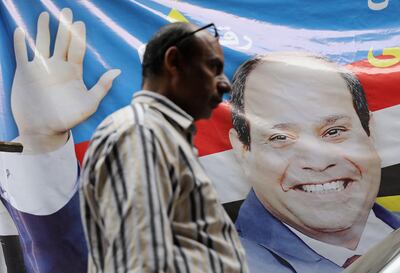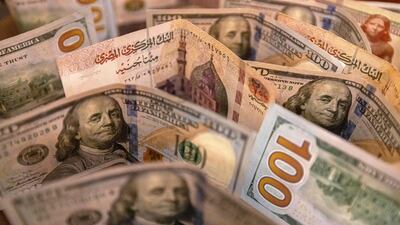Egypt's economy expanded by an impressive 6.6 per cent in the fiscal year that ended on June 30, up from the 3.3 per cent growth registered the previous year, Prime Minister Mostafa Madbouly announced on Thursday.
The last financial year’s growth reflected the swift recovery made after the slump caused by the coronavirus pandemic. But the economy’s sluggish performance in the most recent quarter ― from April to June ― mirrored the devastating impact of the Russia-Ukraine war, the Egyptian prime minister explained.
“The 6.6 per cent growth is one of the biggest in recent years although the fourth quarter of the last financial year was very difficult because of the [Ukraine] war,” Mr Madbouly told a news conference after a Cabinet meeting.
A Cabinet statement quoted Planning Minister Hala Al Saeed as saying the economy surged by 7.8 per cent between July 2021 and March this year, but that growth fell back to 3.2 per cent in the April-June period.

The fallout from the Russia-Ukraine war forced Egypt to devalue its currency in March and curb non-essential imports. It has also led to double-digit inflation that now stands at about 14 per cent.
In addition, the war has hit Egypt’s vital tourism industry hard, as Russian and Ukrainian tourists make up more than 30 per cent of all visitors.
Egypt is currently in negotiations with the International Monetary Fund over an economic restructuring plan that could include a loan from the Washington-based lender.
Meanwhile, rising food prices have also forced the government to increase monetary and material support to the country's poorest families at the cost of billions of pounds and to twice postpone the lifting of state subsidies on electricity as part of the reform programme.

Mr Madbouly said a programme to allow the additional purchase of heavily subsidised food items worth 100 pounds (about $5) a month would be enacted next month. The programme will benefit 9.1 million families, or 37 million people, covered by a state system allowing poorer households to buy items such as bread, rice, pasta and cooking oil at a lower cost.
Referring to the latest expansion of the economy, the prime minister sought to strike an upbeat tone at a time when most Egyptians are struggling to make ends meet.
“It shows that the Egyptian economy is strong as it faces all these unprecedented challenges and is able to withstand massive crises,” he said.
“But the real challenge will be to see our ability to continue to do so if the [Ukraine] crisis continues.”
However Egypt's rapidly growing population remains “the biggest of all challenges”, the prime minister said.
Egypt's population of 103 million is expected to grow by 1.6 million this year, with a total of 2.18 million births and about 600,000 deaths, he said.
“We as Egyptians must pause and consider that we need to have a 10-year programme in which we limit births in young families to two children,” he said.
“If our annual growth is by only 600,000 for 10 years, the burden on the government will be significantly less.”
The government will soon launch a campaign to promote smaller families, he said, and will send through parliament draft legislation to toughen penalties on adults behind the marriage of minors, child labour and pupils dropping out of the school system.
A major motive for having large families in Egypt is to send young children out to work to supplement the family income.

President Abdel Fattah El Sisi, the driving force behind Egypt’s economic reform programme, has repeatedly spoken about population growth as the root of the country’s economic struggles, saying that it wipes out government efforts to modernise the country and bring it prosperity.
But birth control is a sensitive subject in conservative and majority Muslim Egypt, where the large size of families is a source of pride in rural areas.


